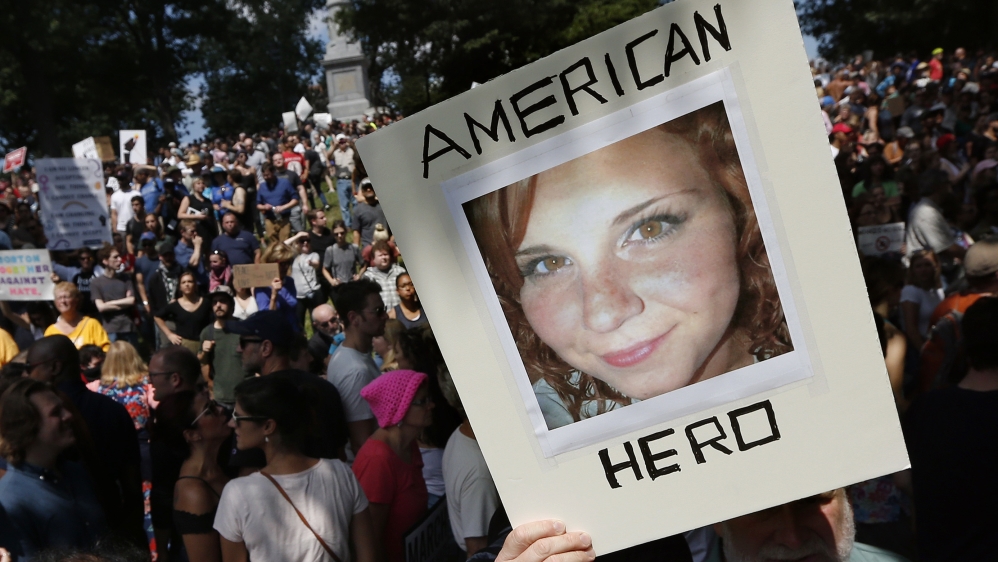Charlottesville: Life sentence recommended for James Alex Fields
A jury recommended life plus 419 years on Tuesday for a man convicted of killing a woman and injuring dozens when he drove his car into counterprotesters at a white nationalist rally in Virginia.
James Alex Fields Jr stood with his hands folded in front of him as a court clerk read the verdict, which now must be taken under advisement by the judge, who will issue the final sentence. Judge Richard Moore scheduled a sentencing hearing for March 29.
The jury reached its verdict after deliberating for about four hours over two days. Judges in Virginia often impose the sentence recommended by juries. Under state law, they can impose lower sentences than what the jury recommends, but cannot increase them.
Before issuing its recommendation, the jury asked Moore if the sentences would run consecutively or concurrently. He replied that sentences usually run consecutively, but that jurors could recommend concurrent sentences if they choose.
‘Forever scarred by the pain’
The jury deliberated for just under two hours Monday after hearing emotional testimony from the mother of Heather Heyer, a 32-year-old paralegal and activist who was killed when Fields rammed his car into a crowd at a Unite the Right white nationalist rally in Charlottesville on August 12, 2017.
Susan Bro, told the jury her daughter’s death has been like an “an explosion in our family.
“We are forever scarred by the pain,” she said.
Jurors also heard from several people who suffered severe injuries. A psychologist testifying for the defence said Fields has a long history of mental health issues, including bipolar disorder.
Jeanne “Star” Peterson said her life has been “a living nightmare” since she was hit by Fields’s car. Her right leg was shattered, and she’s had five surgeries to try to repair it. She also suffered a broken spine and still hasn’t been able to return to work.
“I will be dealing with the aftermath of Fields’s choices for the rest of my life,” Peterson said.
 |
| A counterprotester holds a photo of Heather Heyer at a Free Speech rally in Boston [File: Michael Dwyer/AP Photo] |
Fields drove to Virginia from his home in Maumee, Ohio, to support the white nationalists.
During the rally, the 21-year-old had been photographed marching with Vanguard America, a neo-Nazi group, during the rally. Throughout the day, rally participants clashed with community members, anti-racists and anti-fascists across the city.
Unite the Right, called to oppose Charlottesville’s decision to remove a Confederate statue, was the largest white nationalist rally in the United States in recent times.
The rally brought out thousands of supporters of the alt-right, a loosely-knit coalition of white supremacists, white nationalists and neo-Nazis.
After the rally, as a large group of counterprotesters marched through Charlottesville singing and laughing, he stopped his car, backed up, then sped into the crowd, according to testimony from witnesses and video surveillance shown to jurors.
Wednesday Bowie, a counterprotester who got caught on the trunk of Fields’s car when he backed up and was then slammed into a parked truck and thrown to the ground, told the jury that in addition to a broken pelvis and other physical injuries, she has been hospitalised three times for post-traumatic stress disorder over the past year.
She told the jury, “Please know that the world is not a safe place with Mr Fields in it.”
Fascinated with Nazism
Testifying for the defence, University of Virginia School of Medicine professor and psychologist Daniel Murrie told the jury that while Fields was not legally insane at the time, he has a long history of mental health issues.
Fields had inexplicable volatile outbursts as a young child and was diagnosed with bipolar disorder at age six, Murrie said. He was later diagnosed with schizoid personality disorder.
Murrie said Fields went off his psychiatric medication at age 18 and built an isolated “lifestyle centered around being alone”.
A video of Fields shown to the jury during the first phase of the trial showed him sobbing and hyperventilating after he was told a woman had died and others were seriously injured.
Fields’s lawyer Denise Lunsford called him a “mentally compromised individual” and urged the jury to consider his long history of mental health issues when considering a sentence.
Following the 2017 Unite the Right, President Donald Trump inflamed tensions even further when he said “both sides” were to blame, a comment some saw as a refusal to condemn racism.
According to one of his former teachers, Fields was known in high school for being fascinated with Nazism and idolising Adolf Hitler. Jurors were shown a text message he sent to his mother days before the rally that included an image of the notorious German dictator. When his mother pleaded with him to be careful, he replied: “we’re not the one (sic) who need to be careful”.
Fields also faces dozens of federal charges, including hate crimes, which could result in the dealth penalty. The next step in that case is scheduled for the end of January.
Heyer was among 18 people killed by white supremacists in the US last year, according to the Anti-Defamation League. White nationalist, neo-Nazi and far-right groups that took to the streets in Charlottesville saw permits for a spate of subsequent public events pulled or denied, while hosting services, social media outlets and tech companies cracked down on far-right individuals and groups.
Earlier this month, the FBI released its annual hate crimes report for 2017. It says, hate crimes grew for the third consecutive year, increasing by 17 percent.




